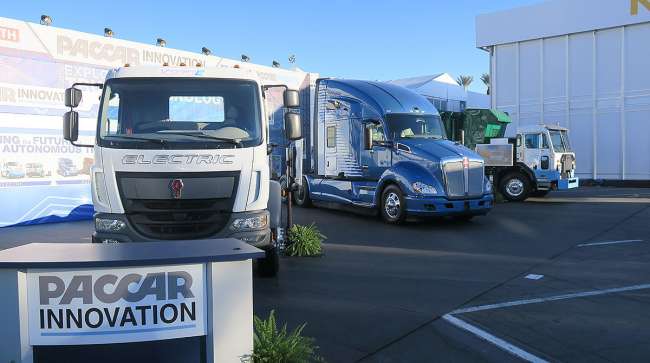Senior Reporter
Paccar Q3 Net Income, Revenue Fall Amid Signs of Rebound

[Ensure you have all the info you need in these unprecedented times. Subscribe now.]
Paccar Inc. reported sharply lower third-quarter net income and revenue although its aftermarket presence, financial services and rebounding truck production provided a lift.
Bellevue, Wash.-based Paccar reported net income for the period ended Sept. 30 dropped to $385.5 million, or $1.11 per diluted share, on revenue of $4.9 billion. That compared with net income of $607.9 million, or $1.75, on revenue of $6.37 billion a year earlier.
“Paccar’s third-quarter results reflect rebounding global truck production and aftermarket parts revenue,” Paccar CEO Preston Feight said in a release.

Feight
During the earnings call, Feight said, “We have seen increases in build rates throughout the third quarter and more than doubling from the second quarter. The fourth quarter will also see increases in daily build rates in all markets.”
He said existing industry heavy-duty inventory is 2.5 months and Kenworth Truck Co. and Peterbilt Motors Co. — Paccar’s North American brands — have about 2.2 months.
Among the quarterly highlights were:
- Paccar Parts’ aftermarket sales and profits surpassed the strong results in the third quarter of 2019, and it will offer charging stations as part of the company’s move into electrification.
- Feight noted e-commerce sales are the fastest growing segment of its parts business.
- The financial services segment sold a record number of used trucks as it generated revenue of $398 million, and plans to finance installation of electric vehicle charging devices.
- Paccar’s truck brands — Peterbilt, Kenworth and DAF (in Europe) — announced order boards were open for their battery-electric trucks, with full production to begin next year.
As for the effect of electric trucks on aftermarket parts sales:
- Paccar believes electric trucks will require a number of replacement parts also found on diesel trucks — including suspension and steering components and various wear items. In addition, battery packs will need to be replaced and charging stations will need replacement parts.
- Feight expects the medium- and heavy-duty market for electric trucks will be in the hundreds of units a year in 2021. Then, in four or five years, as regulatory requirements take hold, that market will become thousands per year and claim 1% of the replacement market.
The company noted research and development expenses are expected to be in a range of $270 million to $280 million this year. Its capital investments are projected to be in a range of $570 million to $600 million.
In 2021, those are expected to rise a little.
Next year, it’s planning for R&D expenses of $330 million to $360 million and capital investments of $575 million to $625 million.

Over the past few episodes, we've had the chance to listen to the experiences of industry leaders and the strategies and planning that go into finding the right people for your workforce. Host Michael Freeze reviews the most important bullet points, from technician and driver training to incorporating diversity in recruitment and retention. Hear a snippet, above, and get the full program by going to RoadSigns.TTNews.com.
“I’ve never been more excited than I am right now about the kind of products we’re bringing out over the coming year or two and going forward for the next five-year strategy we’ve laid out, we have a great set of products coming out,” said Feight.
Meanwhile, Paccar reported it is increasing its estimate of U.S. and Canada Class 8 truck industry retail sales to a range of 190,000 to 210,000 vehicles this year. Class 8 truck industry retail sales for 2021 are estimated to be in a range of 210,000 to 250,000 vehicles.
“It’s a healthy market and I think there’s a lot of uncertainty around what next year will bring in terms of the general economy and COVID-19, and protocols we have in place from a labor control standpoint and making sure our employees are safe and cared for,” Feight said.
Paccar reported it has 29.7% of the market share in the U.S. and Canada year-to-date compared with 29.2% a year earlier.
“U.S. economic growth is being led by manufacturing, housing starts, automotive production and consumer spending,” Paccar Senior Vice President Darrin Siver said. “U.S. and Canada Class 8 truck industry orders through September were 18% higher than in the same period last year.”
Want more news? Listen to today's daily briefing:
Subscribe: Apple Podcasts | Spotify | Amazon Alexa | Google Assistant | More

